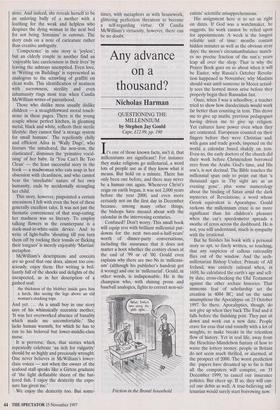Any advance on a thousand?
Nicholas Harman
QUESTIONING THE MILLENNIUM by Stephen Jay Gould Cape, £12.99, pp. 190 I t's one of those known facts, isn't it, that millenniums are significant? For instance they make religions go millenarial, a word lots of people use as if they know what it means. But hold on a minute. There has only been one before, and there may never be a human one again. Whenever Christ's reign on earth began, it was not 2,000 years before the year 2000, and even more certainly not on the first day in December because, among many other things, the bishops have messed about with the calendar in the intervening centuries.
Confused? Don't worry. This small book will equip you with brilliant millennial put- downs for the next two-and-a-half-years' worth of dinner-party conversations, including the assurance that it does not matter a hoot whether the century closes at the end of '99 or of '00. Gould even explains why there are two Ns in 'millenni- um' (although his publisher's handout got it wrong) and one in `millenarial'. Gould, in other words, is indispensable. He is the champion who, with shining prose and baseball analogies, fights to correct non-sci- Friction in the Brontë household entists' scientific misapprehensions.
His assignment here is to set us right on dates. If God was a watchmaker, he suggests, his work cannot be relied upon for appointments. A week is the longest reliable unit of time: months contain hidden minutes as well as the obvious stray days; the moon's circumambulance match- es no precise fraction of the sun's; years leap all over the shop. That is why the Prayer Book goes on so about when it will be Easter, why Russia's October Revolu- tion happened in November, why Muslims should wait until someone in Mecca actual- ly sees the horned moon arise before they properly begin their Ramadan fast.
Once, when I was a schoolboy, a teacher tried to show how duodecimals would work far better than counting in tens. This drove me to give up maths, previous pedagogues having driven me to give up religion. Yet cultures have power even when they are contested. Europeans counted on their fingers before they were Christian and, with guns and trade goods, imposed on the world a calendar based shakily on tens. Even so, the early doctors of the church did their work before Christendom borrowed zero from the Arabs. God's time, and His son's, is not decimal. The Bible touches the millennial span only to point out that 'a thousand ages in Thy sight are as an evening gone', plus some numerology about the binding of Satan amid the dark mysteries of Revelations, a word whose Greek equivalent is Apocalypse. Gould reckons the millennium craze is no more significant than his children's pleasure when the car's speedometer spreads a swathe of zeros across the dashboard. He is not, you will understand, much in sympathy with the irrational.
But he finishes his book with a personal story so apt, so finely written, so touching, that any suspicion of callous rationality flies out of the window. And the arch- millenarian Bishop Ussher, Primate of All Ireland, was entirely rational when, in 1650, he calculated the earth's age and sell- by date, cross-checking the Old Testament against the other archaic histories. That immense feat of scholarship set the creation in 4004 BC, and on the same assumptions the Apocalypse on 23 October 1997. So there. Apocalyptics, though, do not give up when they back The End and it falls before the finishing post. They just sit down and work out a new date. People crave for eras that end roundly with a lot of noughts, to make breaks in the relentless flow of history. Yet in real life, away from the Heseltine-Mandelson fantasy of how to waste the lottery money, people in Britain do not seem much thrilled, or alarmed, at the prospect of 2000. The worst prediction the papers have dreamed up so far is that all the computers will conspire, on 31 December 1999, to cancel our insurance policies. But cheer up. If so, they will can- cel our debts as well. A true-believing mil- lenarian would surely start borrowing now.










































































 Previous page
Previous page